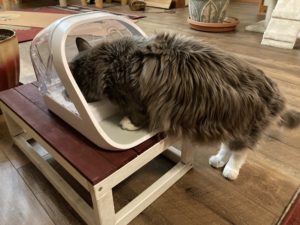
My oldest cat, Athena, is 16 1/2 years old now. She was diagnosed with Chronic Kidney Disease (CKD) and osteoarthritis a few years ago.
- Weight loss
- Poor appetite
- Lethargy
- Increased thirst
- Increased urination
- Vomiting
Kidney disease can result in reduced appetite and weight loss due to underlying nausea. As the kidneys become less efficient, cats drink more and more water to compensate for the reduced filtration, but they just can’t drink enough. One side effect of this draw on the body water by the kidneys can be constipation. And constipation can also result in reduced appetite.
Athena was losing weight, seemed depressed, did not want to eat and was not very active. Her quality of life seemed to be declining.
My vet recommended:
- a laxative
- an appetite stimulant
I added the laxative to Athena’s moist cat food. When she ate things were good.
If she did not eat:
she did not get the laxative >>she would become constipated >> she would not eat even with the appetite stimulant.
I felt we were trapped in a downward spiral.
It is important to treat the whole cat when managing an older cat with multiple disorders.
treat the whole cat
medical treatment
In addition to kidney disease, Athena also suffers from arthritis. Having been a fairly active cat who went on daily walks, it was disheartening to see her decline her walk and stay at home. Her gait became stiffer, in spite of a heated bed and daily exercise in the form of play.
So, I wondered, what if the pain due to arthritis was a bigger player than we thought?
What if stiff and painful>>not moving as much>> bowels don’t move as well>> constipation >>drop in appetite?
I asked my vet “What if we treat the arthritis pain?” Athena moved fairly well in the vet clinic but x-rays showed quite a bit of arthritis in one hip and one knee. The vet prescribed gabapentin twice daily for Athena.
dietary changes
To reduce the constipation, Athena needed more fluid and a laxative. I decided to try a hydration supplement, Purina Hydracare, and added the laxative to the Hydracare. Fortunately, she liked the Hydracare so down went the laxative in a little Hydracare! This way I knew she got the laxative without stressing about her eating her entire meal.
environmental changes
Because her hips are painful, it occurred to me that “maybe crouching down is painful” so I elevated the feeding station. While she eats, she puts weight on her back legs, helping strengthen her back legs, which are most likely weaker from her previous lack of activity.
eureka!
- Athena has responded well to the gabapentin – it does affect her balance a bit but she has become more active again and we have resumed our daily walks.
- Increased activity combined with the hydration supplement and laxative seem to have have eliminated the constipation.
- Athena accepted the elevated feeding station right away – I guess being more comfortable encourages her to eat more.
the takeaway
It is important to “treat the whole cat”. Treating Athena’s arthritis pain seems to have been a game changer. Although reduced appetite and constipation often accompanies kidney disease, reducing the pain of arthritis has balanced this out, increasing mobility and appetite.
She is still an old cat but her quality of life has improved dramatically with these changes.
Want to keep up with the world of cats? Subscribe to The Feline Purrspective!

